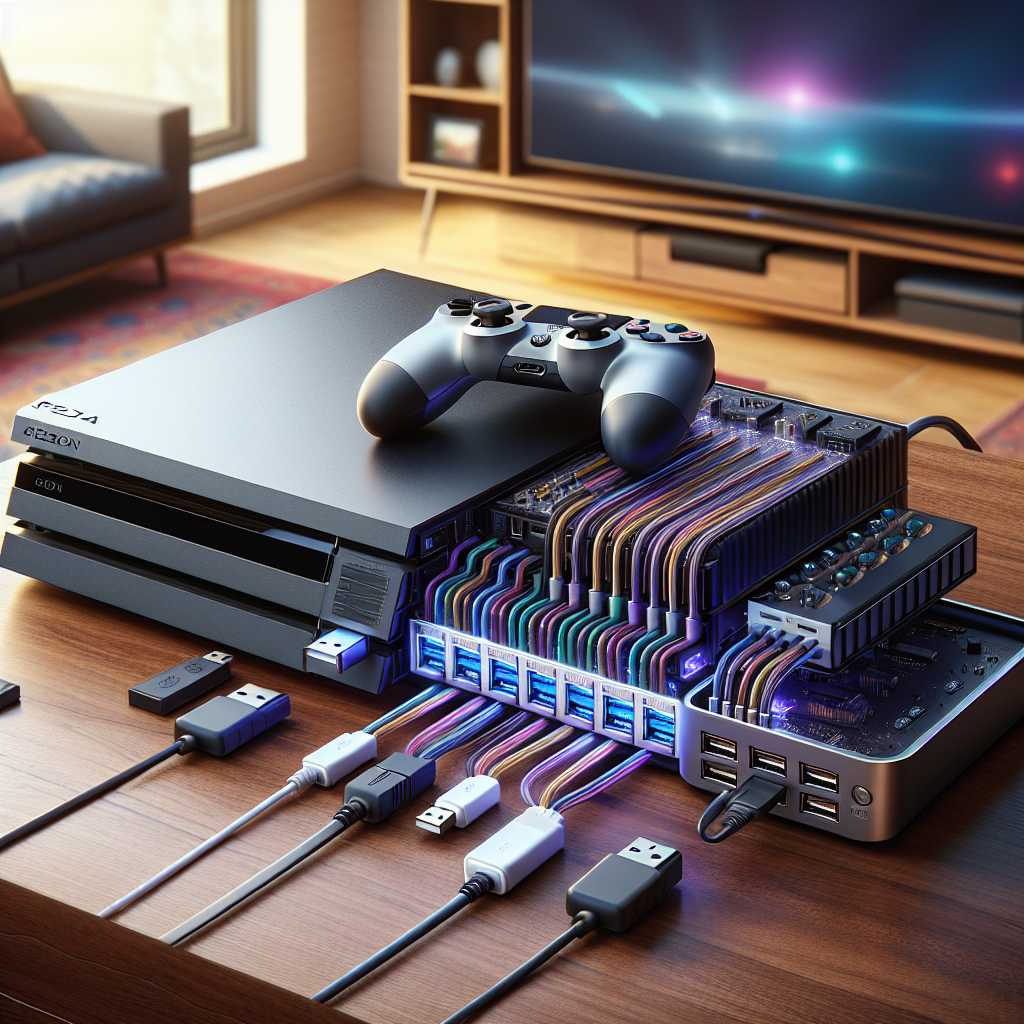Introduction
The PlayStation console, whether it’s the PS4 or PS5, has gained immense popularity for its gaming experiences, multimedia capabilities, and online features. As gamers and media enthusiasts rely on multiple peripherals such as controllers, external storage, and VR equipment, the need for more USB ports becomes increasingly apparent. This leads to a common question: Can I use a USB hub to expand the number of ports on a PlayStation console? In this article, we will explore the answer thoroughly, covering compatibility, functionality, and more.
| Model | USB Ports | Compatible USB Hubs | Limitations |
|---|---|---|---|
| PlayStation 4 (Standard & Pro) | 2 USB 3.0 | Yes, with USB 3.0 support | Limited power from the console |
| PlayStation 5 | 4 USB (2 USB Type-A, 1 USB Type-C, 1 USB 3.0) | Yes, check for USB 3.0 support | Performance may vary |
Understanding USB Hubs
USB hubs are devices that expand a single port into multiple ports, allowing for the connection of additional USB peripherals. They come in various forms, including powered and unpowered options. A powered USB hub has its own power source, while an unpowered hub draws power directly from the host device. When considering a USB hub for your PlayStation, it’s crucial to understand how these devices interact with your console.
Types of USB Hubs
- Unpowered USB Hubs: These hubs rely on the power from the PlayStation console itself. They are typically smaller and portable but may face limitations regarding the number of devices that can be connected simultaneously.
- Powered USB Hubs: These hubs come with an external power source, providing consistent power to multiple devices. They are ideal for high-demand peripherals such as external hard drives and VR equipment.
Compatibility with PlayStation Consoles
Both the PS4 and PS5 support USB hubs, but there are specific compatibility concerns to keep in mind:
PlayStation 4 Compatibility
The PlayStation 4 comes equipped with two USB 3.0 ports located on the front of the console. Using a USB hub with the PS4 can effectively expand the number of connected devices, but limitations exist:
- Be sure to choose a USB hub that supports USB 3.0 to ensure optimal performance.
- Powered hubs are recommended when connecting power-intensive devices like external drives or VR headsets.
- Keep in mind that the PS4 may struggle with numerous power-drawing devices connected through an unpowered hub.
PlayStation 5 Compatibility
The PlayStation 5 takes connectivity further with four USB ports: two USB Type-A ports (USB 3.0) and one USB Type-C port, along with one USB 3.0 port on the rear. This enhanced connectivity allows users to connect even more devices:
- Just like with the PS4, using a USB hub that is USB 3.0 compatible is necessary for full functionality.
- Utilize powered USB hubs for peripherals that require more power or bandwidth.
- Remember that while most hubs will work, performance can sometimes be inconsistent with specific devices.
Limitations of Using USB Hubs on PlayStation Consoles
There are several limitations to consider when using USB hubs with PlayStation consoles:
Power Limitations
One of the biggest challenges is that power from the PlayStation may not be sufficient for multiple high-demand devices. Unpowered hubs can lead to performance issues or device disconnections due to insufficient power.
Bandwidth Bottleneck
Even if a hub is connected, bandwidth limitations may cause some devices to perform below their potential, especially if multiple devices are used simultaneously. This is particularly true for gaming peripherals like controllers and VR systems.
Firmware and Software Issues
Some USB hubs might not work correctly with PlayStation consoles due to firmware compatibility issues. Always check compatibility with your specific hub to avoid any unnecessary frustrations.
Best Practices for Using USB Hubs with PlayStation Consoles
To enhance your experience while using USB hubs with your PlayStation console, consider the following best practices:
- Choose the Right Hub: Opt for a high-quality USB hub that supports USB 3.0 or higher. Powered hubs are recommended for connecting devices that require more energy.
- Minimize Connected Devices: Try to limit the number of connected devices to avoid bandwidth congestion.
- Regular Firmware Updates: Keep your USB hub’s firmware updated. Although this is less common for simple hubs, some advanced hubs may have firmware that can improve performance.
- Positioning Matters: The location of the USB hub can affect performance; avoid using excessively long cables that might introduce latency or power loss.
Conclusion
In conclusion, using a USB hub to expand the number of ports on your PlayStation console is a viable solution for gamers looking to connect multiple devices. Both the PS4 and PS5 are compatible with USB hubs, provided they follow certain guidelines concerning power and compatibility. With the right hub and practices, you can enjoy all the features and functionalities of your console without fretting over the limited number of USB ports. Whether you’re connecting additional controllers, external drives, or VR equipment, a USB hub can enhance your gaming and entertainment experience.

